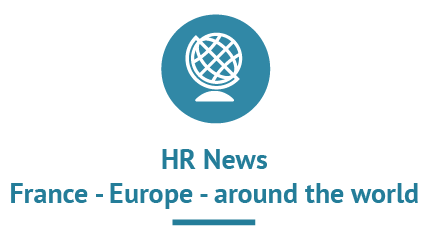|
If you are having trouble viewing this email, please
download the PDF version
or contact us.
|
 |
| #02 - February 2018 |
| PDF version - Manage your subscription - Search - Archives |

|
|
vision RH is a newsletter published by the French Directorate General for Administration and the Civil Service (DGAFP).
It draws on information sources and reports issued by public administrations, the private sector, international organisations and the press, in several different languages. It aims to provide a broad view of current human resources and civil service initiatives. |
|

|

|
| “Lagom” or the Swedish model applied to the quality of the working environment | |||||
|
As a trailblazer for both gender equality and work-life balance, Sweden is renowned for the numerous measures that it has rolled out. The flagship initiative is the 480-day paid parental leave, which may be shared between both parents. The scheme’s appeal is also heightened by the tax relief that is granted to parents who share their paid parental leave equally. Unlike Japan and many Western countries, working more than the statutory weekly working hours is not perceived as a feat in Sweden but as a warning that the workload should be reviewed, or even as a sign of inefficiency. Only 1% of the workforce work overtime and, together with the Netherlands, this is one of the lowest rates in OECD countries. The philosophy of “lagom”, which translates as “just the right amount”, is part of Swedish culture and has effortlessly graduated to the workplace. The goal is to significantly lower stress levels by introducing ways to find balance in all aspects of people’s everyday lives. Besides regulations dealing with family life, working time reorganisation has been mainstreamed with around 60% of workers enjoying flexitime and/or teleworking arrangements, some 20% more than the European average. “Lagom” is epitomised by a particular leadership method that is used in ten of the country’s largest firms. It is centred on a responsible approach from managers who “are coached to not burn out their staff by planning in advance and prioritising better; many company decisions are made collaboratively but staff are encouraged to leave early on occasion. By feeling trusted, they are likely to go above and beyond at the times the business most needs it”. This involves true teamwork with all employees being more informed for the decision making process. The quality of the working environment is a mainstay of the Swedish strategy and an organisation has been set up, endowed with its own resources, to ensure that this quality is subject to ongoing improvements. Forte is a research council founded in 2011 which has been advising the government on wellbeing and health in the workplace since 2013. In late 2016, it unveiled a ten-year national research programme. In respect of operational considerations, public and private sector employers have access to Arbetsmiljöverket, the Swedish Work Environment Authority, which is primarily tasked with ensuring compliance with legislation. However, as from 1 June 2018, they will be able to use the services of a new work environment agency, Myndighet för arbetsmiljökunskap, which will be based in Gävle and which will help them implement measures relating to the quality of the working environment, and will be responsible for assessing these measures. |
|||||
|
|||||
|
|
|||||

|
|||||

|

|

|
| Launch of the final stage of the “Blueprint 2020” reform in Canada | |||||
|
A Public Service Renewal Results Plan represents the last stage in public sector reform. Three outcomes are being aimed for: a Public Service that enables new and existing public servants to be in the right place, at the right time, doing the right things, that has efficient and effective processes, tools, practices and organisational structures and that embodies a healthy workplace. Eight specific actions are being taken to achieve these outcomes, and their implementation and progress will be tracked and reported back to employees and Canadians using indicators. |
|||||
|
|||||
|
|
|||||

|
|||||
| Personal data concerning moves to the private sector is being put online in Spain | |||||
|
When they move to the private sector, Spain’s high-ranking civil servants have to inform the Conflicts of Interest Office (which reports to the Ministry of Finance and Civil Service) of the duties that they will take up. Since early February, the government has been publishing personal information regarding authorisations issued by the civil service on its transparency portal. |
|||||
|
|||||
|
|
|||||

|
|||||
| A framework for optimal HR management structures in Australia | |||||
|
The Australian Public Service Commission (APSC) has established a new framework to improve the effectiveness of organisational layers in the agencies. Developed by the Deputy Secretaries Efficiency Working Group, the framework lays down five robust HR notions: hierarchy restricted to five organisational layers, delegation of decision making, process streamlining, innovation and adaptability, and consistent classification of jobs. |
|||||
|
|||||
|
|
|||||

|
|||||

|

|
| A campaign to attract talented individuals to the German civil service | |||||
|
In an attempt to overcome recruitment difficulties, the federal government is launching an awareness-raising “second step” campaign aimed at the highest echelons of the private sector. Applicants are not subject to any age limit and employers must give equal consideration to internal and external candidates, and select them solely on the basis of their qualifications and experience. |
|||||
|
|||||
|
|
|||||

|
|||||
| AXA supplements its training system | |||||
|
As a business with a culture of learning, AXA is striving to provide its staff worldwide with training resources while giving them more autonomy to map out their career paths. These massive online open courses (MOOC, which are flexible and which lead to qualifications, are supplementing existing options. An initial review points to significant take-up (20% more certifications of course completion). |
|||||
|
|||||
|
|
|||||

|
|||||
| Workshops to foster career development in the Netherlands | |||||
|
The EC O&P (Expert Center Organization and Personnel) of the Ministry of the Interior and Kingdom Relations has set up collective workshops to prepare staff who so wish for changing positions within the civil service. Four topics are available: building a business network, enhancing candidate profiles, presenting organisational structures from an “employer brand” standpoint and effective communication within a department. |
|||||
|
|||||
|
|
|||||

|
|||||

|

|
| Variable-term probationary periods for supervisors and managers in the United States | |||||
|
Amongst the measures contained in the new Ensuring a Qualified Civil Service (EQUALS) Act is the option of extending the probationary period of newly-appointed senior executives to two years. Federal agencies are now able to use this additional period to offer extra training and to conduct a proper assessment before granting (or not) career employee status. |
|||||
|
|||||
|
|
|||||

|
|||||
| The “confidence-based management” strategy at Grand Paris Sud Est Avenir | |||||
|
This local authority in the South-East of the Greater Paris region has introduced a ground-breaking management strategy for which the buzzwords are innovate, experiment, listen and involve. The novelties of the new organisational structure include participatory organisation charts (38% of employees’ suggestions were used), managerial coordination systems and inverted management committees to upend the hierarchical structure. |
|||||
|
|||||
|
|
|||||

|
|||||
| An assessment of officials based on their use of evidence in the United Kingdom | |||||
|
At the five-year anniversary of the What Works Network, the government is acting on the recommendation of its national What Works adviser, David Halpern, and is set to introduce “evidence” criteria into the assessment of officials. To this end, a dedicated Cabinet Office team is working on defining competencies that include a scientific approach and use of research outcomes. |
|||||
|
|||||
|
|
|||||

|
|||||

|

|
| Publication of a European guide to tackling psychosocial risks at work | |||||
|
As the first guide produced by the social partners of the central government administrations of 21 Member States and of other European countries, it provides insight into psychosocial risks. It is the fruit of a project that was co-managed by the Directorate General for the Administration and the Civil Service (DGAFP) between 2015 and 2017 and it recommends an overall strategic approach encompassing both individual and collective, as well as corrective, measures, which will all be supported as part of social dialogue. |
|||||
|
|||||
|
|
|||||

|
|||||
| Analysis of a survey into happiness in the workplace | |||||
|
A paper written by seven academics has highlighted - based on data from a survey into working conditions conducted by the French Directorate for the Coordination of Research, Studies and Statistics (DARES) – the score on the World Health Organization’s well-being index depending on the worker profiles defined by the authors. For instance, tension in relations with superiors reduces this score to 10.3 from an average of 15.6. |
|||||
|
|||||
|
|
|||||

|
|||||
| Tripartite agreement on public sector digitalisation signed in Norway | |||||
|
Modernisation, the Union of Municipal and General Employees (Fagforbundet) and the Association of Local and Regional Authorities. It commits the three partners to engage in constructive social dialogue and active worker participation in shaping the processes and policies that will accompany the roll-out of future digital services. |
|||||
|
|||||
|
|
|||||

|
|||||

|

|
| Orange, the advance guard for the “right to disconnect” in major French firms | |||||
|
A little over a year ago, the French telecoms operator signed an agreement on digitalisation with three unions representing 58.5% of staff. It was the first of the French CAC 40 companies to execute such an agreement. Four commitments are enshrined in this three-year arrangement, one of which is a guaranteed “right to disconnect” for employees including - and this was also a first - during working hours. Since 1 January 2017, firms with more than 50 employees must “initiate talks on the right to disconnect and implement digital application use-regulation procedures with an eye to ensuring respect for rest and leave time, as well as personal and family life”. 1 However, in practice, these measures are difficult to apply. A July 2017 Ifop poll revealed that almost 80% of executives consult and reply to business-related emails during their free time, and this trend has been rising sharply since 2015. To address this issue, ANACT (National Agency for the Improvement of Working Conditions) offers an online instrument, that was designed in conjunction with a trade association and that is intended to help the stakeholders assess the state of play in companies in respect of quality of the working environment as part of digitalisation. |
|||||
|
|||||
|
|
|||||

|
|||||

|

|
| “Partnership for Change”, the Slovenian public-private sector exchange programme | |||||
|
The idea came to Boris Koprivnikar, the Slovenian Deputy Prime Minister and Public Administration Minister, when he met with young Americans during a trip to the US. It involved setting up a bold and innovative exchange programme between his civil servants and private sector workers designed to break stereotypes, share best practices and move boundaries to show that cooperation between the public administration and business in a new, different and innovative manner, works. In 2015, the Ministry of Public Administration signed a partnership agreement with the American Chamber of Commerce in Slovenia (AmCham Slovenia) for an initial exchange involving 27 employees. Buoyed up by positive feedback which provided a substantial boost for the public sector’s image, the programme was both renewed for a second round and gradually extended to include other ministries and more Slovenian and international companies based in the country. The number of participants has increased five-fold over the last three years and the project now counts eight ministries and 46 businesses. work together to come up with proposals for innovative solutions to one of the five common challenges identified for the Partnership for Change: • Cooperation across the ministries • Employee motivation • Slovenian national brand (I Feel Slovenia) • E-public services • Skills of the 21st century From the outset, the project has been supported by the highest government echelons. Prime Minister Miro Cerar describes it as “an example of a future cohabitation model in modern Slovenia”. He also emphasised the excellent collaboration between two important players in society which encourages further partnerships between the economy and state administration. FThe Partnership for Change programme has already begun to be acknowledged outside Slovenia. In 2016, it was awarded the Creative Network Award. In 2017, it was selected, from over 150 applications, to be presented at the World Government Summit, that was organised by the OECD’s Observatory of Public Sector Innovation and held in Dubai. |
|||||
|
|||||
|
|
|||||

|
|||||

|
|
Share
|
||||
|
||||
| SUBSCRIBE - UPDATE YOUR SUBSCRIPTION - ARCHIVES - RSS - UNSUBSCRIBE |
|
French Directorate-General for Administration and the Civil Service (DGAFP)
Publication Manager: Thierry LE GOFF Managing Editor: Xavier MAIRE Editor-in-chief: Jean-Marc CHNEIDER Publication Coordinator and Autor: Jean-François ADRIAN Layout and graphic design: Jean-François ADRIAN and Alphania. The texts of the publication do not reflect the point of view of the DGAFP
In accordance to the French Act n°78-17 of 6 January 1978 on information technology, data files and civil liberties and to the european General Data Protection Regulation (GDPR), your personal data is stored securely and you are entitled to access, correct and delete them. To do so, you should send an e-mail to (contact-visionrh.dgafp@finances.gouv.fr) or write to DGAFP: 139, rue de Bercy - 75012 Paris; France.
Reproduction is authorized with mention of the source © DGAFP 2019 / N° ISSN: 2606-7528. |
|
|



